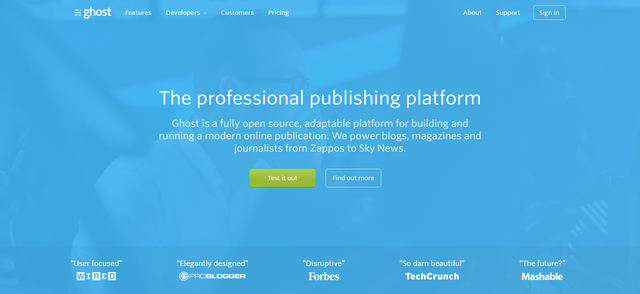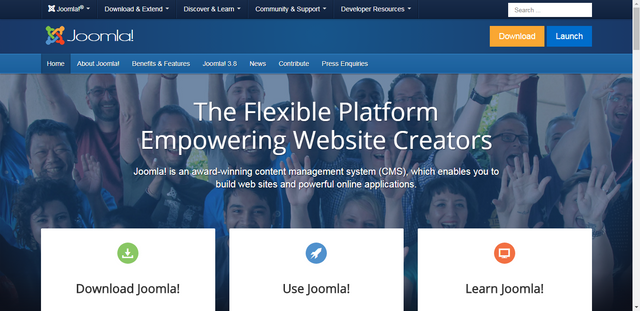Steemit Versus The World: Comparing It To Other Blogging Platforms

If you're thinking of starting a blog, the most important factor to consider is choosing the right blogging platform. There are many out there and it's hard to think which is which especially to someone without any experience.
So how do you choose the right blogging platform?
There are many things to consider, things like how technical it can be, how much money and time you want to invest, how profitable would it be and the list goes on.
In this blog post, I'll share with you the best out there along with their advantages and disadvantages.
But before anything else, since this is your first time blogging you might want to consider the blogging platforms that are easy to use with no technical background required as well as the kind of blogs you're going to produce.
As time goes on, when creating contents become a habit and your blog grows, then it's time to improve your blog like having a more professional look or accepting guest posts. It's important to choose a platform that has room for growth.
It is also important to know what would motivate you in continuing your blog because like all bloggers and writers, you'll eventually get burned out, experience writer's block and other things that will stop you from writing.
It can be money or recognition, maybe having a lot of followers or even teaching people things you like them to know could be a great motivation.
So, let's go with the list of the best blogging platforms out there.
Steemit

When you mix social media and a blogging platform, this is the result. You can write long or short posts, treat it like Instagram showcasing your photos or go live while playing games like Youtube while earning on your contents.
In simple words, it's like Facebook but it rewards users with money in the form of cryptocurrency called Steem.
Pros:
- You can start earning once your account is created.
- There are hundreds and hundreds of helpful communities
- Easy set up and use because it has a simple interface
- Too many spammers.
- There is no customization so you can't personalize your blog
- Can be overwhelming because of the sheer number of communities
Wordpress

Wordpress is definitely the most popular blogging platform and more than 30% of all websites are Wordpress.
It's not just a blogging platform anymore as it can be used for e-commerce, portfolio, company websites and the list goes on.
There are 2 Wordpress websites and they are both free, wordpress.org is where you can build and customize your blog however you want it to be and wordpress.com that is easier to manage but has limited features compared to the other one.
Pros:
- Tutorials are easily available online.
- Search engine friendly
- Has tremendous room for improvement
- Using it needs a lot of study
- Earning takes time because you need to grow your blog first
Blogger

One of the easiest blogging platform to use. It is owned by Google and you can set up a blog in less than 10 minutes and start writing.
Pros:
- Advisable for people without any technical skills
- Reliable and secured since it is powered by Google.
- Basic platform, no special features or tools.
- It has few templates so you can't design it the way you want.
- Google owns it so they can shut it down anytime.
Tumblr

Tumblr is a microblogging platform that is easy to use, extremely popular and social communities for every niche you can think of.
Pros:
- Free and simple to use
- Integrated social media component like reblog, liking other blogs and a live feed from other blogs.
- Limited features especially for growing blogs.
- Difficult to import to other platforms
Medium

Medium is a blogging platform that is similar to Twitter except that you can create long articles. It has some social networking features and an already established audience waiting to read what you have in mind.
Pros:
- Audience is already available so you can reach to people that has the same interest.
- No design needed making you focus on purely writing.
- Can't run ads to make money.
- Medium owns your blog.
- Not available in other countries.
Squarespace

Squarespace focuses on elegance and an easy, drag and drop feature to build your website from scratch. It is suitable for small businesses who wants to showcase online by having a blog or a website.
Pros:
- Beginners will enjoy building their website because of the drag and drop tool.
- Domain names are available for purchase.
- SSL/HTTPs and e-commerce stores are also available for everyone.
- Templates are beautiful and professional looking.
- It is not free and has limited features especially for the personal plan.
- Lacking in marketing tools.
Ghost

This blogging platform is intended for minimalist lovers as it is solely focused on writing blog posts. It is straightforward and it uses markdown writing style. You can host it on Ghost's servers or you can download and self host.
Pros
- Perfect for people who focuses on purely writing and blogging
- It's quick and has a clean interface which makes it beginner friendly
- There are only few themes available.
- Installing it yourself is complicated so it's not recommended for none tech savvy.
- It is not free
Joomla

Similar to Wordpress, Joomla is an open source blogging platform that needs a domain name and web hosting. You can easily create dynamic websites with it.
Pros:
- There are a lot of extensions are available to make your website more powerful and flexible.
- Several types of websites can be built on it like blogs, e-commerce, businesses etc.
- Resources are limited because its community is smaller than Wordpress
- You are on your own for the backups, updates and security of your Joomla website.
Wrapping up
So these are the lists of the popular blogging platforms online. I use Steemit and Wordpress for my blogs because they can be integrated now using a plug in called Steempress which can make my income double.Nonetheless, it's still up to you on what platform you want to try. Just pick the best one that suits your style, goals and needs.
Posted from my blog with SteemPress : https://pressitup.com/steemit-versus-the-world-comparing-it-to-other-blogging-platforms/